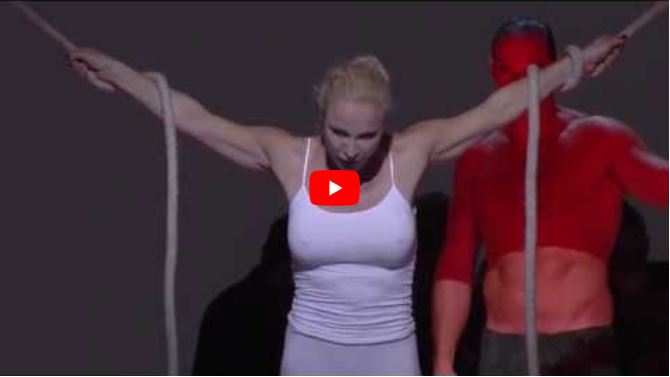Poul Ruders, The Handmaid's Tale
The Handmaid’s Tale is a powerful opera by Poul Ruders, based on the world renowned novel by Margaret Atwood. Audiences are thrust into the troubling Republic of Gilead where women are completely stripped of their rights in a patriarchal society. Ruders cleverly uses his minimalist composition to depict this unnerving dystopia, with medieval chanting representing their archaic practices, and gospel music representing the ‘religious’ justification behind it.
We learn about the ins and outs of Gilead through the eyes of the Handmaid, Offred. It’s through her daily life that we understand the horrors that face all fertile women in this version of reality. Within the novel, it’s through Offred’s first person account, which Ruders had to adapt for an opera with multiple roles.

Philip Glass, The Marriages Between Zones Three, Four and Five
The Marriages Between Zones Three, Four and Five is a two act opera by minimalist composer Philip Glass. It is based on the second book in the ‘Canopus in Argos’ series by science fiction author, Doris Lessing. Representing the differences between men and women, this is considered to be one of the best examples of a feminist dystopian tale…
In this world, Shikasta or Earth is surrounded by six zones, each made up of their own ‘societies’. These zones act like independent countries, with their own leaders and ways of living, which can cause friction between opposing ideologies. The opera follows the conflict between zone three, a gentle, matriarchal society run by Queen Al-Ith and zone four, a chaotic society run by a warrior King. If left unresolved, this dispute could have disastrous consequences, disrupting the balance of this ‘new world’ as they know it.

Lorin Maazel, 1984
1984 is one of the most famous dystopian novels by George Orwell. American composer, Maazel, transformed this infamous tale into a chilling opera for new audiences to enjoy. It is set in a surveillance state, in the ‘not too distant future’, where citizens are controlled by an ever watching oppressor called ‘Big Brother’. This has lent itself to many adaptations in popular culture, from the popular reality TV show, to the operatic stage.
It follows the life of Winston as he begins to question the authoritarian world around him. After falling in love with fellow citizen ‘Julia’ he begins to commit small acts of rebellion. But, whenever an individual shows any signs of going against the state they are sent to the mysterious ‘Room 101’. It’s here the opera reaches its dramatic finale where the audience discovers just how citizens are kept in line…

Leoš Janáček, The Makropulos Affair
The Makropulos Affair is a czech opera by composer Leoš Janáček, based on the popular play by Karel Čapek. It is set in a relatively familiar society, with only one core difference to the world we know – eternal life is possible. Thanks to an envelope containing the elixir of life, Ellian MacGregor has lived for 300 years.
However, she found everlasting life mundane, and decided to give the gift of eternal youth to Kristina who burns the envelope and chooses a shorter, more meaningful life. Therefore, the opera raises questions around the idealistic notion of eternal youth, as perhaps in reality, it’s not quite what we dreamed it would be. Related Content: The Handmaid’s Tale: Opera and Beyond; Related Content: The Beginner’s Guide to Philip Glass



